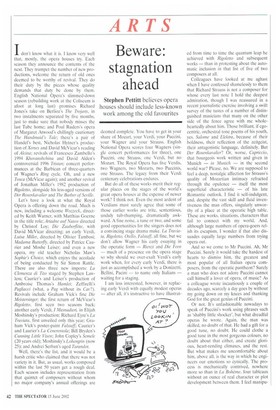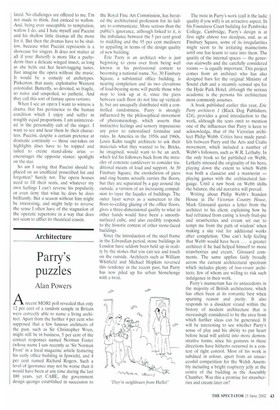Beware: stagnation ahead
Stephen Pettitt believes opera houses should include less-known work among the old favourites
Idon't know what it is. I know very well that, mostly, the opera houses try. Each season they announce the contents of the next. They trumpet the number of new productions, welcome the return of old ones deemed to be worthy of revival. They do their duty by the pieces whose quality demands that duty be done by them. English National Opera's slimmed-clown season (rebuilding work at the Coliseum is afoot at long last) promises Richard Jones's take on Berliciz's The Trojans, in two instalments separated by five months, just to make sure that nobody misses the last Tube home; and Foul Ruders's opera of Margaret Atwood's chillingly cautionary The Handmaid's Tale; there's a pair of Handel's best, Nicholas Hytner's production of Xerxes and David McVicar's reading of Alcina; revivals of Francesco Zambello's 1994 Khovanshchina and David Alden's controversial 1996 Tristan; concert performances at the Barbican of three-quarters of Wagner's Ring cycle. Oh, and a new Tosca (McVicar again); and another revival of Jonathan Miller's 1982 production of Rigoletto, alongside his less-aged versions of Der Rosenkavalier and The Barber of Seville.
Let's have a look at what the Royal Opera is offering down the road, Much is new, including a welcome Wozzeck, directed by Keith Warner, with Matthias Goerne in the title role; Ariadne auf Naxos directed by Christof Loy; Die Zaubetflote, with David McVicar directing; an early Verdi, Luisa Miller, directed by Olivier Tambosi; Madama Butterfly, directed by Patrice Caurier and Moshe Leiser; and even a new opera, my old teacher Nicholas Maw's Sophie's Choice, which enjoys the accolade of being conducted by Sir Simon Rattle. There are also three new imports: La Clemenza di Tito staged by Stephen Lawless; Caurier's and Leiser's production of Ambroise Thomas's Hamlet; Zeffirellfs Pagliacci (what, a Fag without its Ow?). Revivals include Graham Vick's fine Die Meistersinger; the first return of McVicar's Rigoletto, first seen two seasons back; another early Verdi, I Masnadieri, in Elijah Moshinsky's production; Richard Eyre's La Traviata, first unveiled only this year; Graham Vick's poster-paint Falstaff; Caurier's and Laurier's La Cenerentola; Bill Bryden's Cunning Little Vixen; John Copley's Semele (20 years old); Moshinsky's Lohengrin (now 25); and Andrei Serban's aged Turandot.
Well, there's the list, and it would be a harsh critic who claimed that there was not variety in it. But, as usual, works composed within the last 50 years get a rough deal. Each season includes representation from that quintet of composers without whom no major company's annual offerings are
deemed complete. You have to get in your share of Mozart, your Verdi, your Puccini. your Wagner and your Strauss. English National Opera scores four Wagners (single concert performances for three), one Puccini, one Strauss, one Verdi, but no Mozart. The Royal Opera has five Verdis, two Wagners, two Mozarts, two Puccinis, one Strauss. The legacy from their Verdi centenary celebrations endures.
But do all of these works merit their regular places on the stages of the world's great opera houses at the expense of newer work? I think not. Even the most ardent of Verdians must surely agree that some of those earlier works are trite, sententious, unduly tub-thumping, dramatically awkward. A fine noise, a tune or two, and some good opportunities for the singers does not a convincing stage drama make. La Traviata, Rigoletto, Otello, Falstaff, all fine, but we don't allow Wagner his early essaying in the operatic form — Rienzi and Die Feen
— much of a presence on the opera stage so why should we over-exalt Verdi's early work when, for every early Verdi, there is just as accomplished a work by a Donizetti, Bellini, Pacini — to name only Italians — waiting for a staging.
am less interested, however, in replacing early Verdi with equally modest operas
— after all, it's instructive to have illustrat
ed from time to time the quantum leap he achieved with Rigoletto and subsequent works — than in protesting about the automatic inclusion in that list of five of two composers at all.
Colleagues have looked at me aghast when I have confessed shamelessly to them that Richard Strauss is not a composer for whose every last note I hold the deepest admiration, though I was reassured in a recent journalistic exercise involving a swift survey of the tastes of a number of distinguished musicians that many on the other side of the fence agree with me wholeheartedly about him. Those brilliant, if egocentric, orchestral tone poems of his youth, yes. Salome and Elektra, because of their boldness, their reflection of the zeitgeist, their antagonistic language, definitely. But Der Rosenkavalier? Or. worse, Capriccio, that bourgeois work written and given in Munich — in Munich — in the second world war? Please, no. We are supposed to feel a deep, nostalgic affection for Strauss's quality of Mozartian intimacy refracted through the opulence — itself the most superficial characteristic — of his late Romantic outlook. I find it self-indulgent, and, despite the vast skill and fluid inventiveness the man offers, singularly unworthy of a place at the operatic high table. These are works, situations, characters that fail to connect with my world. And, although large numbers of opera-goers relish its escapism, I wonder if that also dissuades equally large numbers from trying opera out.
And so we come to Mr Puccini. Ah, Mr Puccini. Surely it would take the hardest of hearts to dismiss him, the greatest and most popular of all Italian opera composers, from the operatic pantheon? Surely a man who does not adore Puccini cannot call himself a lover of opera, of music? As a colleague wrote incautiously a couple of decades ago, scarcely a day goes by without my going down on my knees and thanking God for the great genius of Puccini.
Or not. It's unfashionable nowadays to speak of Puccini's work using phrases such as 'shabby little shocker', but what dreadful operas he wrote. Again, the man was skilled, no doubt of that. He had a gift for a good tune, no doubt. He could clothe a good tune in the most gorgeous colours, no doubt about that either, and create glorious, heart-rending climaxes, and the rest. But what makes me uncomfortable about him, above all, is the way in which he engineers our emotions so cynically. The process is mechanically contrived, nowhere more so than in La Boheme, four tableaux without an ounce of real character or plot development between them. I feel manipu
lated. No challenges are offered to me. I'm not made to think. Just enticed to wallow. And, being ever susceptible to temptation, wallow I do. and I hate myself and Puccini and his shallow little dramas all the more for it. But then the dramas have to be shallow, because what Puccini represents is a showcase for singers. It does not matter at all if your Butterfly is more like a pachyderm than a delicate winged insect, as long as she belts out her heart-tugging tunes. Just imagine the opera without the music. It would be a comedy of archetypes. Pinkerton. that nasty, exploitative Western colonialist. Butterfly, so devoted, so fragile, so naive and unspoiled, so pathetic. And they call this sort of fantasy opera verismo.
When I see an opera I want to witness a drama that has pertinence to the human condition which I enjoy and suffer in roughly equal proportions. I am uninterested in the personality cult of the singer. I want to see and hear them be their characters. Puccini, despite a certain pretence at dramatic continuity — those out-takes on highlights discs have to be topped and tailed to create stand-alone arias — encourages the opposite stance: spotlight on the star.
So am I saying that Puccini should be placed on an unofficial proscribed list and forgotten? Surely not. The opera houses need to fill their seats, and whatever my own feelings I can't reverse his popularity or even deny that what he does he does brilliantly. But a season without him might be interesting, and might help to reverse the sense I often have of the stagnation of the operatic repertoire in a way that does not seem to afflict its theatrical cousin.



































































 Previous page
Previous page